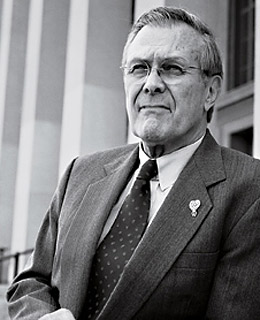
Donald Rumsfeld is a terrier of a defense secretary: sharp, strong, always barking—and rarely willing to back down. He has won plaudits from many for forcing a heavy and hidebound U.S. military into a leaner, meaner fighting machine. He achieved pop-icon status on the Pentagon podium while orchestrating the military's quick win in Afghanistan and its rockier progress in Iraq. But many in uniform questioned his prewar second-guessing of deployment orders, saying they led to costly delays. Rumsfeld also miscalculated the duration of hostilities in Iraq, the number of troops required and the casualty count.
Yet Rumsfeld's determination is embraced by President George W. Bush. The Defense chief is the lone senior member of Bush's original Cabinet serving in the second term. Rumsfeld's pragmatism serves to moderate the impact of the Administration's neoconservatives. And, besides, Rumsfeld's tenure effectively amounts to a continuing presidential endorsement of the war plan. These days, Rumsfeld, 72, is focused on the Pentagon top brass. He pays far closer attention to the advancement of senior officers than did his predecessors. Some wonder whether his micromanaging of promotions is creating a Pentagon in which there's no real debate and senior officers become an echo chamber for his views. At a hearing last fall, Senator John McCain complained to Rumsfeld that McCain didn't need to get an answer from Joint Chiefs Chairman Richard Myers because "I know it will be exactly the same as yours."
Rumsfeld's impact on the Pentagon will probably last well beyond his stay in his E-ring office. He is overseeing the top-to-bottom, congressionally mandated Quadrennial Defense Review now taking place. More important, he has grasped the military by its lapels, shaken it firmly and demanded changes that are both unpleasant and needed.